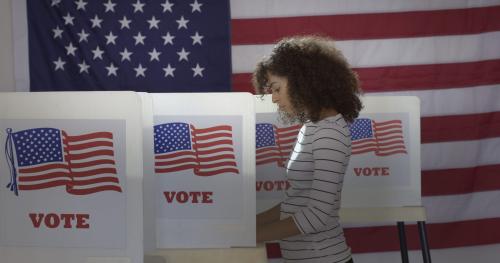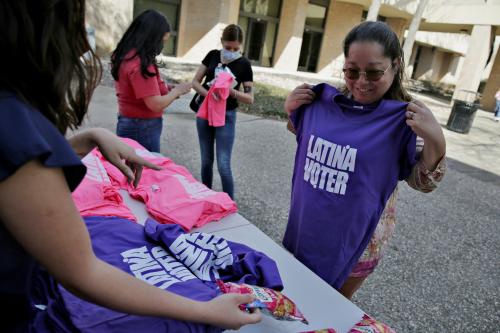The Supreme Court recently announced that it would hear arguments on the sweeping changes enacted by the 2010 Affordable Care Act. On November 16, Russ Wheeler took your questions regarding the future of the law in a live web chat moderated by POLITICO.
12:33 Russell Wheeler: On Monday, the Supreme Court added a likely blockbuster case to a docket already full of high profile cases when it agreed to consider challenges to the Obama administration’s most prominent legislative achievement, the Affordable Care Act. The Court’s decision could have major effects on 2012 electoral politics, on the law governing Congressional regulatory authority, on the Court’s standing among the American public and on health care policy in the United States. Experts are all over the map in their predictions of the likely outcome, especially because there were some surprises in the decisions on the matter by some of the judges on the courts of appeals.
12:33 Comment From Raphael: Why has the Supreme Court decided to hear this case? Do you think there is a realistic chance the law could be ruled unconstitutional?
12:34 Russell Wheeler: It’s taken the case because the nation needs answers to whether the law will be implemented. There has been a split among the appellate courts as to its constitutionality. It’s not beyond reason that the Court may declare the so-called individual mandate to be unconstitutional.
12:34 Comment From Anne: What aspects of the law do you think will prove most controversial before the court?
12:35 Russell Wheeler: The requirement that almost everyone buy health insurance or pay a penalty for not doing so. The logic of the requirement is that insurance companies can’t offer the broader coverage the law requires without a larger pool. Opponents say the government has overreached in imposing the
requirement to do something.
12:35 Comment From Don: How quickly do you think we can expect a ruling from the Court? Will the decision play into the 2012 presidential election?
12:36 Russell Wheeler: The case will probably be argued in March—over two days—quite extraordinary. The Court announces decisions in all cases in which it has heard oral argument in a term by the end of June. So we’ll probably get a decision in the heat of the presidential campaign.
12:37 Comment From Zoey: Any guess at this early juncture as to how the Court might rule?
12:38 Russell Wheeler: Hard to say. I think most observers believe the Court will uphold the individual mandate, based on a 2005 decision affirming congressional authority to prohibit personal growth of marijuana, a decision that both Justices Kennedy and Scalia joined. If so, we’d have the so-called liberal bloc of four plus two others. But I wouldn’t bet a lot of money on an outcome one way or the other.
12:38 Comment From Anthony: What if the court strikes down the law? Will America’s health care system immediately revert back?
12:40 Russell Wheeler: Only a small part of this very large law is directly at issue. But one of the questions the Court has agreed to decide is whether the individual mandate is so central to the law that without it, the law cannot survive at all. But even if the entire Act were thrown out, unlikely, there are changes in the health care system that will persist. Read an article in yesterday’s New York Times on that subject.
12:40 Comment From Joe: Does any precedent exist for a challenge to a case such as this one?
12:41 Russell Wheeler: There is a long body of precedents about Congress’s authority to regulate economic and other activity based on its authority to regulate commerce among the states. From the 1930s until 1995, that power seemed almost without limit. The court scaled back that authority in a series of cases starting in 1995, but see the reference I made to the 2005 case about marijuana.
Watch for the 1942 case of Wickard v. Filburn. That will be crucial in the arguments.
12:41 Comment From Sally: Should any of the judges (ex Thomas, Kagan) recuse themselves because of their outside involvement with the Affordable Care Act?
12:43 Russell Wheeler: It appears that they will not. There’s no indication that either of them sat out the decision to grant certiorari. From what I know, I don’t think recusal is required in either case, and could be especially problematic here if it led to a 4-4 decision, which would affirm the Eleventh Circuit ruling striking down the mandate on procedural rather than substantive grounds.
12:43 Comment From Karl: Which states are challenging the law in the Supreme Court? Do they share any common thread?
12:43 Russell Wheeler: 26 states, all with Republican governors or attorney generals.
12:43 Comment From Bill in Va: Do you think the decision by the Court next year will have a major impact on the election? I mean, if they find in Obama’s favor, won’t it be a big boost? But if they find against him, won’t it be a huge blow?
12:45 Russell Wheeler: One can play out multiple scenarios. Court upholds the law and that reinvigorates Republican efforts to repeal it legislatively. Court strikes down the individual mandate—Obama campaigns against an activist judiciary. You can play out others. I think one thing that would be really unfortunate is if the Court struck down the law 5-4, with all five Republican appointees voting against it and the four Democratic appointees voting to uphold it. The Court’s standing before the American public has been declining and such a result would not help restore it.
12:45 Comment From Dan: Are the ‘checks and balances’ in the American system now out of control? From a European point of view, the ability of Congress and the judiciary to litigate things to death in America seems extraordinary, and is producing deadlock at a time when action is needed.
12:47 Russell Wheeler: Good question, although I don’t think our impulse to litigate explains all the deadlock. We live within a society that has long turned to the courts to resolve political questions, as de Tocqueville reminded us. It’s interesting that conservatives, who for so long railed against judicial “activism,” are now more comfortable with it since the composition of the judicial branch changed.
12:47 Comment From Grey: Do you think the recent controversy surrounding Justice Kagan will result in her recusing herself from this ruling? Are you aware of any right-leaning Justices that may have a similar conflict?
12:48 Russell Wheeler: I answered that earlier. I think no justice would insist on participating in a case knowing that s/he had a conflict of interest that might come to light after the Court announced its decision. Same goes for Justice Thomas, although a little more transparency about whatever contact he may have had with the law’s opponents would be welcome.
12:48 Comment From Bill in Va: Also, I read somewhere that Kennedy and Souter might rule very narrowly on the issue of just the mandate, and not get into the overall constitutionality of the law. Thoughts?
12:49 Russell Wheeler: I think you probably meant Scalia rather than Souter. Generally, judges look for narrow rather than broad rulings. There are four questions before the Court—the mandate, whether it’s severable from the Act, whether the Act’s expansion of state responsibilities to Medicaid recipients is constitutional (no court below said it was) and whether the challenges to the Act are premature.
12:50 Comment From Reid: Can states be forced by the federal government to expand their share of Medicaid costs and administration, with the risk of losing that funding if they refuse?
12:51 Russell Wheeler: That’s one of the questions before the Court. As I mentioned, no lower court agreed with the argument but the Court asked for briefing on it nonetheless. The states are in a bind because it’s unrealistic to say that if they don’t like the conditions they can drop out of Medicaid, a program on which a lot of their needy residents rely.
12:51 Comment From Karen K: It’s been mentioned that the Court may put off any final decision until the individual mandate begins impacting people. What chance does this have of happening, and what impact would it have?
12:52 Russell Wheeler: The Fourth Circuit’s Court of Appeals and one of the judges on the DC Circuit both adopted that view, and the Court agreed to hear arguments about it. From a practical standpoint, such an approach could be very problematic, forcing the states to do two years of heavy preparation for implementation without knowing if the Act would survive once challenged in 2014.
12:53 Comment From Abigail: The Supreme Court has allocated five hours to hear the arguments. Given the importance of the issue, will that be enough?
12:54 Russell Wheeler: It’s quite surprising. The last time the Court allotted more than usual time was when it gave four hours to the McCain-Feingold Act. The justices have the time to hear as much argument as they want, and I presume they thought five hours was enough. Keep in mind that they’ll be inundated with friend-of-the-court briefs in addition to those of the parties, and they have the thoughtful opinions of the Court of Appeals judges as well. They’ll be sufficiently informed.
12:56 Comment from Joanne: Can you explain Wickard v. Filburn a bit more?
12:57 Russell Wheeler: This was a 1942 case in which the Court said a wheat farmer could be barred from producing more wheat than his statutory allotment, even though he had no intention of selling the wheat. He wanted it for his livestock and family, but the Court said that would keep him out of the market, and collectively, such action could affect interstate commerce. The Act’s supporters say that if Congress could force Roscoe Filburn to buy wheat it can force anyone to buy insurance. Opponents say Filburn didn’t have to buy wheat on the market—he could have lived with what he had or gone into another line of agriculture.
12:57 Comment From Suzanne: How concerned should the Obama administration be that the law will actually be overturned?
12:59 Russell Wheeler: Concerned enough that they’re making plans to see how to hold the Act together without the mandate, although they’ve said it is crucial to other parts of the Act. They seem pretty confident in public, and sought a quick review of the Eleventh Circuit decision striking down the mandate.
12:59 Vivyan Tran: Thanks for the great questions everyone. See you next week.



Commentary
Web Chat: Supreme Court Set to Rule on Health Care Reform Bill
November 16, 2011